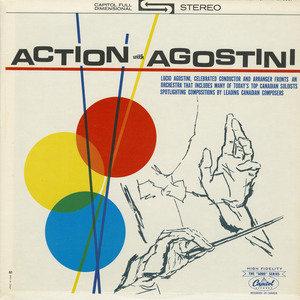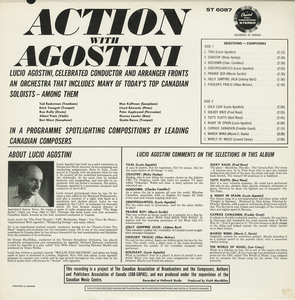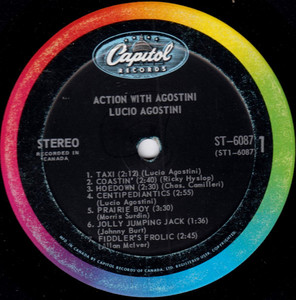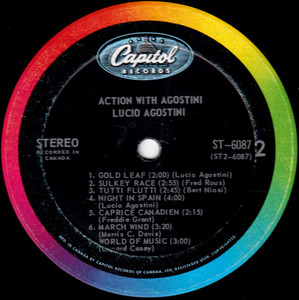Information/Write-up
Lucio Agostini (December 30, 1913 – February 15, 1996) was one of Canada’s most prolific and versatile composers, arrangers, and conductors, whose career spanned the formative years of Canadian radio, film, and television. Born in Fano, Italy, he emigrated to Montreal with his parents in 1919. His father, Giuseppe Agostini, a respected composer and conductor, instilled in him a love of music and gave him his earliest training in woodwinds, cello, harmony, and composition. By fifteen, Lucio was already playing saxophone, clarinet, and cello in his father’s orchestra; at sixteen he joined the Montreal Philharmonic Orchestra under Eugène Chartier, laying the foundation for a career defined by technical mastery and stylistic range.
In the 1930s, Agostini quickly emerged as a conductor and arranger for Montreal radio. His first professional engagement came with CFCF, and by 1932 he was writing film scores for Associated Screen News, where he remained until 1944, ultimately serving as music director. His scores for the National Film Board’s wartime shorts—including the Canada at War and The World in Action series—brought his work to millions. At the same time, he became a vital presence in Canadian broadcasting, conducting for the CRBC and later the CBC, where he composed and directed music for programs such as Stage (1944–55), Ford Theatre (1949–55), CBC Wednesday Night, and countless radio dramas and variety shows. His work for Shakespeare productions inspired his Shakespearean Suite for Strings (1948), a piece that remains one of his most enduring concert works.
Agostini’s reputation rested not only on his speed and precision, but also on his ability to bring drama and colour to every assignment. As Pierre Berton once remarked, “Lucio was one of the best two or three composers and directors for television, radio, films, that we had in Canada. He was very inventive for the kind of things he was doing. He was very fast—and very good.” These qualities made him the first call for a wide range of CBC projects, from variety specials to ambitious dramas. His own series—including Strictly for Strings, Appointment with Agostini, Music Album, Collage, and Music to Remember—further cemented his presence in Canadian households. From the 1950s onward he also served as conductor and arranger for Front Page Challenge, a role he maintained for over two decades, and music director for the Juliette show during its peak years.
Though broadcasting was his main arena, Agostini also composed extensively for film and the stage. His musicals included Willie the Squowse (1968), Gibraltar (1975), and Divorce (1976), while his film scores ranged from Inside Out (1975) and Ragtime Summer (1977) to animated features like The Little Brown Burro (1978) and Ichabod Crane (1978). In the concert hall, his Piano Concerto (1948) and Flute Concerto (1960) revealed his symphonic breadth, the latter recorded by Nicholas Fiore with the Albert Pratz Orchestra for the RCI label. His Trio Québécois (1970), written for clarinetist Avrahm Galper, demonstrated his skill for chamber textures. Even late in his career he continued composing, including the incidental music for the 1980 CBC dramatization of Robertson Davies’ Fifth Business.
Agostini’s recordings for the Canadian Talent Library further showcased his versatility, with albums such as Mas Mucho Lucio (1968), which featured his original compositions Leah’s Latin Lover, Caramba, and Black Rose, and Cold Shoulder and Hot Brass, a brassy set of standards and originals. His centennial soundtrack Once Upon a Hundred Years (1967), recorded with Moe Koffman, Rob McConnell, Guido Basso, and other leading Canadian jazz musicians, remains a vibrant time capsule of the optimism and energy of 1960s Canada.
His contributions did not go unnoticed: he won four successive Canadian Radio Awards as best composer-conductor, and in 1983 received ACTRA’s John Drainie Award for distinguished contributions to Canadian broadcasting. He also arranged and conducted for leading Canadian singers such as Alys Robi, Juliette, and Tony Ziccardi, and collaborated with musicians as diverse as Bert Niosi, Erich Traugott, Moe Koffman, Peter Appleyard, and Guido Basso.
Lucio Agostini died in Toronto in 1996 at the age of 82, leaving behind a vast legacy of music that touched nearly every Canadian household for half a century. His manuscripts are preserved at Library and Archives Canada, ensuring that his contribution to the nation’s musical and cultural life endures. A bridge between the orchestral tradition of his European roots and the emerging voice of Canadian popular and broadcast music, Agostini remains one of the central figures in the country’s artistic history.
-Robert Williston
Liner notes:
ABOUT LUCIO AGOSTINI
Lucio Agostini has built up a solid reputation in Europe and North America via his composing and conducting assignments. Born in Italy, Lucio moved to Canada with his parents when he was 5. He studied all the woodwind instruments and the violoncello. At the same time he studied harmony and composition, and was able to experiment with his father’s orchestra. His father, Giuseppe Agostini is a prominent composer and conductor at the C.B.C.
Lucio turned professional when he was 16, became a solo cellist in the Montreal Philharmonic, and also a member of a night club band as a saxophone and clarinet player. Later he was engaged by the C.B.C. as composer for dramatic shows. He then became musical director of Associated Screen News. He began a series of radio programmes called, “The Stage Series” which ran from 1944 to 1955. Through this series Lucio won four successive Canadian Radio Awards as the best composer-conductor in Canada.
Lucio wrote for “The Ford Theatre”; “CBC Wednesday Night”; “Let There Be Music”; “Appointment With Agostini”; “Whispering Strings”; and many others.
He is an experienced musical comedy conductor, having led the “Theatre Under The Stars” singers and orchestra for two successive years. He is one of the most respected musicians in Canada since he has always demanded the best musicianship and discipline from the members of his orchestras.
Sir Ernest MacMillan, conductor of the Toronto Symphony Orchestra, has played symphonic arrangements and compositions by Agostini. Bernard Herrman conducted a score by Agostini in a play called “Life With Adam” featuring Fletcher Markle and produced by Orson Welles.
Lucio has written a musical comedy “WILLIE THE SQUOWSE” and plans are being made to have it produced in London, England. Now with this album Lucio Agostini prepares to conquer new worlds and he has proved throughout the years that in the field of music there will always be “Action” with Agostini.
LUCIO AGOSTINI COMMENTS ON THE SELECTIONS IN THIS ALBUM
TAXI: (Lucio Agostini)
A man in search. Not for happiness. Not for money. But for the most elusive of all things—a taxi.
COASTIN’: (Ricky Hyslop)
Hyslop, who is now doing the maestro chores on the Juliette CBC TV Program, wrote this waltz for another TV show called ‘Telescope’. Waltz and Jazz—a tasty mixture for the educated ear.
HOEDOWN: (Charles Camilleri)
As a dance the jig is popular all over the world. Whether Canadian, American, Irish or English its happy lilt finds every man and woman tapping their feet.
CENTIPEDIANTICS: (Lucio Agostini)
For the sober man to pronounce. And for the sober fiddler to play!
PRAIRIE BOY: (Morris Surdin)
This was written as theme music for a scenario for a film by W. O. Mitchell called ‘WHO HAS SEEN THE WIND’. It depicts well the imposing panorama of the West with its lonesomeness.
JOLLY JUMPING JACK: (Johnny Burt)
This selection typifies the versatility of Canada’s most sought after arranger-composer.
FIDDLERS’ FROLIC: (Allan Mclver)
No rest for the wicked. Again our fiddlers grab the bow by the horn. The result—with a slight taste of the Latin-American—demonstrates the quality of the Canadian composer and performer.
GOLD LEAF: (Lucio Agostini)
What is Goldleaf? Part of a plant! A sheet of metal! A new drink! When you hear this let your imagination run unrestrained. Maybe you'll find the answer.
SULKY RACE: (Fred Rous)
The place—Manitoba. The site—The Carmen Fair. The event—A harness race. In it, Fred Rous tries to give the musical feeling from the start of the race, the strain and pull, down the back stretch. The winner? 30 musicians in a deadheat.
TUTTI FLUTTI: (Bert Niosi)
Bert is a very versatile musician. He could have performed this solo on sax, clarinet, flute, piccolo, trumpet, trombone or piano. However he chose the lightest one to transport—the Tin Flute.
A NIGHT IN SPAIN: (Lucio Agostini)
The theme song of a yet-unproduced television series called ‘Tonight in Havana’... Produced by Desi Arnaz, Directed by Fletcher Markle, with a cast of well-known Hollywood celebrities. The flavour is very Cuban and nostalgic of the wonderful days and nights spent in Havana.
CAPRICE CANADIEN: (Freddy Grant)
A tribute to Freddy’s adopted country—Canada. He was born in Germany and composed the most famous song of World War II—“You’ll get used to it.” The title became a catch phrase of the Allies and helped sustain the morale which carried us to final victory.
MARCH WIND: (Morris C. Davis)
Originally written for woodwind quartet. Morris describes it as a musical pastel in the popular idiom with a somewhat wistful feeling.
THE WORLD OF MUSIC: (Len Casey)
Music is a sideline to Len. He is one of the major television producers at the CBC. A few years ago Len produced a musical series for the CBC called “The World of Music”. Len assigned me to write the theme song for the series. The result is herewith.
This recording is a project of The Canadian Association of Broadcasters and the Composers, Authors and Publishers Association of Canada (CAB–CAPAC), and was produced under the supervision of the Canadian Music Centre.
Ted Roderman: trombone
Erich Traugott: trumpet
Ron Rully: drums
Albert Pratz: violin
Bert Niosi: saxophone
Moe Koffman: saxophone
Lloyd Edwards: piano
Peter Appleyard: percussion
Murray Lauder: bass
Guido Basso: trumpet
Arranged and conducted by Lucio Agostini
Produced by Keith MacMillan
Recorded at Hallmark Studio, Toronto, Ontario





No Comments